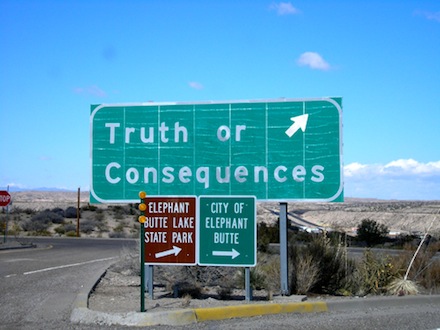

Posted 29 Aug 2009
We all tell every six year old child that they should always tell the truth: no exceptions. Most of us believe the adage that the truth will set us free. This is a very simple concept that is easily understood by everyone.
This absolute construction is also an incomplete, oversimplified and incorrect view of a more nuanced issue of telling the truth. For example, the truth does not necessarily mean that we must disclose all information that we know in response to a vague, limited or accusatory questio
In other circumstances, even an overt lie is acceptable. We all condone the actions of the family who hid Anne Frank during the Nazi occupation, even if they overtly told the police that they were not hiding anyone within the walls of their home. Nobody would say that in such a situation it is wrong to lie in order to save a life from unjustified aggression.
I would like to illustrate the first, more common and more applicable situation regarding the principle of withholding some "truth" in response to vague, limited or accusatory questions. In the movie Liar Liar, Jim Carey's character was cursed with the inability to withhold some of the truth. My dad had a similar experience.

The Example
I recently spent some time in Los Angeles California. When I told my dad about where I had visited he recounted that it was the location of the famous accident that he had many years ago. I had heard the story but never knew where it had occurred. The events of the accident are a good example of why we should not always tell all of the truth and limit our response or even deny some things.
The Target
My dad tapped the back of another car when entering into an intersection. Both he and the woman driving the other car got out and inspected the cars. There was no damage at all and no injuries either, so both agreed to be on their way. Following the collision, the woman in the other car received several cosmetic surgery procedures, including a nose job, and other surgeries.
Some months later, after my dad did not remember much about the incident because it was so minor, an investigator contacted him. My dad was asked about the collision and my dad responded that he was in fact involved in an incident.
Instead of answering affirmatively at this point, it would have been better to deny involvement or to simply say “I don't know what you are talking about.” This likely would have ended the investigation into the matter because there was otherwise no physical evidence of the collision, no dents on either car, no visible scratches and no accident report.
The “truthful” answer, that he was involved, gave enough credibility to the woman's accusations that a personal injury claim was brought against my dad.
The Cost
The summons and complaint were served on Christmas Eve, what a nice present. The woman was seeking compensation for the cosmetic surgeries which she had undergone since the collision and there were charges for hit and run. The case was finally dismissed when my dad showed up in court with his attorney and the woman did not show up for trial.
If you have ever been involved in a lawsuit, you understand just how much time and energy is involved in preparing a case for trial. There are potentially countless pre trial motions and procedures, discovery procedures including depositions, possible expert witness involvement and many other things.
This represents hundreds of hours of preparation time for the attorneys alone, not to mention the stress and anxiety of the parties involved with the suit.
The Truth
The woman was obviously targeting my dad, trying to threaten him into settling the case out of court to avoid the hassle of court, even though her claims were completely without merit. She could not show up in court because the evidence would have clearly shown that, not only was my dad not the cause of any of her “damages” but that her lawsuit was a misuse of the justice system.
The Moral Of The Story
Ultimately, the “truth” would have set my dad free. The evidence would have clearly shown that he was not liable for damages. The more nuanced understanding of the principle would have led my dad not to admit involvement in the incident. It is a principle of justice that the accuser has the burden of proof. Not admitting involvement would have avoided a huge amount of monetary, emotional, and temporal cost. It takes practice to perfect this concept if you are unfamiliar with placing the burden of proof on your accuser.
The best thing you can do is ask questions like "why do you ask?" or “what are you talking about?” in a serious tone whenever anyone accuses you of something and continue to avoid admitting any involvement.
My favorite is to use these two questions in conjunction with each other when someone is probing an area I find sensitive. "That is interesting, Why do you ask?" If they present a good reason then I follow up with, "Well, what difference does it make?"
Do this often, even if you are accused of eating the last cookie in the cookie jar. Thus, when you are faced with a situation like the one my dad had, you will be prepared to avoid the frustration that he endured. A complete strategy for understanding these principles is found in the book How To Vanish.